It was Woody Allen who imagined the authentic tragic dimension of the Nietzschean eternal return theory. For every new repeated life, the same as all the others, a new opportunity to suffer The Sound of Music. Be careful, it is Allen, not us, who renounces the musical to the greater glory of the Trapp family. But, truth be told, one can come to understand Allen's caution. It is not clear whether Joshua Oppenheimer had the New Yorker's reflection in mind when he imagined The End, but the reverberation, so to speak, is there. Let us explain.
The director, previously known for documentaries as devastating, murky, and irrevocable as The Act of Killing (about the genocide in Suharto's Indonesia), makes his fiction debut. And being aware of the consequences of the most extreme barbarism, he decides that the plot of his grand debut should be nothing other than the end of the world. The title is not just a play on words, which it is, with the proverbial sign that concludes any movie, it is also a clear and forceful warning: beyond this, there is nothing.
But given that an ending of something so tremendous (more tremendous than Everything, only Nothing comes to mind) requires a staging that matches, Oppenheimer decides that it has to be, attention, a musical. Yes, one of those musicals where the actors, instead of saying "Good afternoon," say "Gooood afternoooon." Not only does it add a mysterious component like the music itself, but it also elongates the sentences. This end of the world lasts almost three hours in an attempt to turn around and reach the next one that will come.
Let's say that there, in the divine eccentricity of its melodic essence, lies the virtue and penance of Oppenheimer's proposal. As is the rule in his previous works, the center that articulates everything has to do with representation. In fact, and in the director's own words, much of his cinema deals, before anything else, with cinema itself. In his most celebrated work, The Act of Killing, the leaders of the Indonesian genocide, many of them 'respectable' men in today's Indonesia, portray their heinous acts. We are talking about a brutal coup that, between 1965 and 1966, exterminated nearly half a million people. In front of the camera, the perpetrators of the massacre become interpreters of their own crimes, perhaps convinced of the redeeming function of cinema. And so, the entire film, between strangeness and horror, takes on the character of a doubt: What are we looking at?
Now, that effect of strangeness or just representation (cinema looking at itself in cinema) is provided by the always baroque and unreal musical genre. A family lives in a bunker built in a salt mine, completely oblivious to the environmental disaster that ravages everything on the surface. The survivors maintain a perfect existence of luxury, exquisite urban rules, high culture, and, as mentioned, occasionally sing. There are Tilda Swinton, Michael Shannon, and George MacKay as, respectively, mother, father, and son born when everything was already lost. And so it goes until a stranger, Moses Ingram, arrives and everything blows up. The supposed stability and education were just that: supposed.
Everything works in Oppenheimer's film. The plot, while not original, seems impactful; the performances, as befits the actors, are precise, and the assumed risk, truth be told, is always appreciated. The problem is the time (or, rather, the tempo). The pace is not just slow, it is simply tiresome. Which is not the same. That and a repertoire of songs that are manifestly improvable (meaning, very bad) are the direct reasons why during the almost three hours in the cinema, we wish more than once for it all to end. And by all, we do not mean the movie. All is everything.
Definitely, worse than watching The Sound of Music again is watching The End again. Once is enough.
